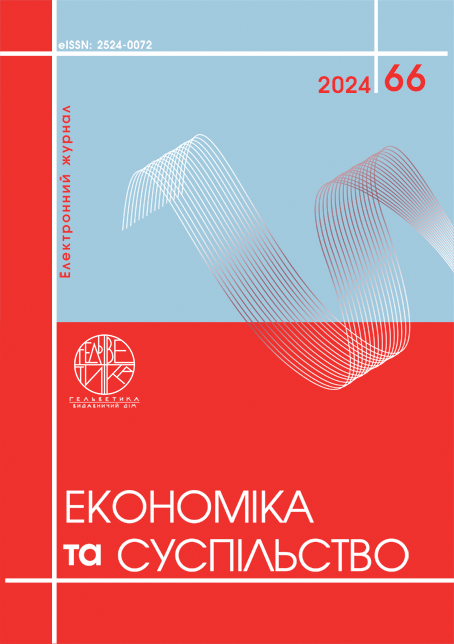THE IMPACT OF DIGITALIZATION ON TRANSFER PRICING IN UKRAINE
Abstract
Digitalization serves as a powerful catalyst for change in contemporary society, significantly transforming business models, interactions between enterprises and consumers, and governmental structures. It enables organizations to optimize operations, reduce costs, and enhance efficiency through automation and data analytics. By streamlining processes, businesses can respond more swiftly to market fluctuations and consumer preferences, fostering a dynamic environment that encourages innovation. One of the critical impacts of digitalization is the alteration of consumer behavior. With the rise of digital marketing, companies can maintain constant communication with consumers across various platforms, gaining deeper insights into their needs and preferences. This shift allows businesses to tailor their offerings more effectively, ultimately leading to improved customer satisfaction and loyalty. Furthermore, digitalization facilitates the integration of national economies into global trade networks. This integration empowers small and medium-sized enterprises (SMEs) to access international markets that were previously dominated by larger corporations. As a result, SMEs can expand their reach and competitiveness on a global scale, contributing to economic growth and job creation. Social changes are another significant aspect of digitalization. The demand for skilled professionals in information technology, data analytics, and cybersecurity is rapidly increasing. This shift not only creates new job opportunities but also necessitates the upskilling of the existing workforce to meet the evolving demands of the digital economy. Governments are also leveraging digitalization to enhance public services through initiatives such as "smart government" solutions. These initiatives aim to make administrative processes more transparent and accessible to citizens, improving overall governance and public trust. However, alongside these advantages, digitalization presents several challenges that organizations must navigate. Regulatory risks stemming from legislative changes pose a significant concern for businesses. Alterations in tax policies, reporting requirements, environmental regulations, and labor laws can have profound implications for operational strategies. Companies must remain vigilant and adaptable to these changes to mitigate potential negative impacts on their financial performance. Moreover, the rise of cyber threats associated with increased digital activity necessitates substantial investments in data security measures. Organizations must prioritize safeguarding sensitive information to protect themselves from potential breaches that could undermine consumer trust and lead to financial losses. In summary, while digitalization acts as a catalyst for transformative change across various sectors, it also requires organizations to adapt proactively to new realities. Successful implementation of digital strategies can significantly enhance competitiveness and drive overall development within countries. By embracing innovation and addressing regulatory challenges head-on, businesses can position themselves favorably in an increasingly interconnected global marketplace.
References
Трансфертне ціноутворення (ТЦУ) в Україні – BDO. Міжнародна аудиторська компанія BDO – BDO. URL: https://www.bdo.ua/uk-ua/services-2/tax-and-legal-practice/transfer-pricing-(tp)
Трансфертне ціноутворення (ТЦУ) в Україні – BDO. Міжнародна аудиторська компанія BDO – BDO. URL: https://www.bdo.ua/uk-ua/services-2/tax-and-legal-practice/transfer-pricing-(tp)
Трансфертне ціноутворення – сучасні аспекти застосування – Юридична Газета. Юридична газета – онлайн версія. URL: https://yur-gazeta.com/publications/practice/mizhnarodne-pravo-investiciyi/transfertne-cinoutvorennya--suchasni-aspekti-zastosuvannya.html
pareto. Трансфертне ціноутворення, ТЦУ в Україні у 2024 році. Pareto. URL: https://tco-audit.com.ua/ua/chto-takoe-transfertnoe-cenoobrazovanie/
Зварич Р. Ризик-менеджмент цифрової трансформації в умовах пандемії. / Р. Зварич, Ю. Дудник, В. Гомотюк, С. Боднар // Вісник економіки № 1, 2022 р. С. 38–53. URL: http://dspace.wunu.edu.ua/bitstream/316497/45934/1/Зварич.PDF
Іваненко О. Трансфертне ціноутворення як інструмент управлінського обліку / О. Іваненко // Фінансовий облік. – 2022. – № 5. – С. 45-52. [Електронний ресурс]. – Режим доступу: https://galicianvisnyk.tntu.edu.ua/pdf/64/842.pdf
Податковий кодекс України / «Дебет-Кредит» – Нормативні документи. «Дебет-Кредит» – Нормативні документи. URL: https://docs.dtkt.ua/doc/2755-17
Сидоренко М. Трансфертне ціноутворення в умовах глобалізації / М. Сидоренко // Глобалізація та її вплив на економічну політику. – 2021. – С. 78-85.
Коваленко Т. Методи трансфертного ціноутворення: порівняльний аналіз / Т. Коваленко // Облік і аудит. – 2020. – № 4. – С. 33-40.
Грищенко В. Цифровізація податкової системи України / В. Грищенко // Податкова політика. – 2022. – № 2. – С. 50-56.
Остапенко Р. Теоретичні засади трансфертного ціноутворення. Repository (electronic archive of open access) of the State Biotechnological University: Home. URL: https://repo.btu.kharkov.ua/bitstream/123456789/51073/1/conf-14-15-03-24-mater-319-321.pdf (дата звернення: 21.09.2024).
Мудрик А. Трансфертне ціноутворення в оподаткуванні: випускна кваліфікаційна робота / А. Мудрик ; Західноукраїнський національний університет, факультет фінансів та обліку, кафедра фінансів ім. С.І. Юрія – Тернопіль, 2023.
Transfertne tsinoutvorennia (TTsU) v Ukraini – BDO. Mizhnarodna audytorska kompaniia BDO – BDO. URL: https://www.bdo.ua/uk-ua/services-2/tax-and-legal-practice/transfer-pricing-(tp)
Transfertne tsinoutvorennia (TTsU) v Ukraini – BDO. Mizhnarodna audytorska kompaniia BDO – BDO. URL: https://www.bdo.ua/uk-ua/services-2/tax-and-legal-practice/transfer-pricing-(tp)
Transfertne tsinoutvorennia – suchasni aspekty zastosuvannia – Yurydychna Hazeta. Yurydychna hazeta – onlain versiia. URL: https://yur-gazeta.com/publications/practice/mizhnarodne-pravo-investiciyi/transfertne-cinoutvorennya--suchasni-aspekti-zastosuvannya.html
pareto. Transfertne tsinoutvorennia, TTsU v Ukraini u 2024 rotsi. Pareto. URL: https://tco-audit.com.ua/ua/chto-takoe-transfertnoe-cenoobrazovanie/
Zvarych R. Ryzyk-menedzhment tsyfrovoi transformatsii v umovakh pandemii. / R. Zvarych, Yu. Dudnyk, V. Homotiuk, S. Bodnar // Visnyk ekonomiky № 1, 2022 r. S. 38–53. URL: http://dspace.wunu.edu.ua/bitstream/316497/45934/1/Zvarych.PDF
Ivanenko O. Transfertne tsinoutvorennia yak instrument upravlinskoho obliku / O. Ivanenko // Finansovyi oblik. – 2022. – № 5. – S. 45-52. URL: https://galicianvisnyk.tntu.edu.ua/pdf/64/842.pdf
Podatkovyi kodeks Ukrainy / «Debet-Kredyt» – Normatyvni dokumenty. «Debet-Kredyt» – Normatyvni dokumenty. URL: https://docs.dtkt.ua/doc/2755-17
Sydorenko M. Transfertne tsinoutvorennia v umovakh hlobalizatsii / M. Sydorenko // Hlobalizatsiia ta yii vplyv na ekonomichnu polityku. – 2021. – S. 78-85.
Kovalenko T. Metody transfertnoho tsinoutvorennia: porivnialnyi analiz / T. Kovalenko // Oblik i audyt. – 2020. – № 4. – S. 33-40.
Hryshchenko V. Tsyfrovizatsiia podatkovoi systemy Ukrainy / V. Hryshchenko // Podatkova polityka. – 2022. – № 2. – S. 50-56.
Ostapenko R. Teoretychni zasady transfertnoho tsinoutvorennia. Repository (electronic archive of open access) of the State Biotechnological University: Home. URL: https://repo.btu.kharkov.ua/bitstream/123456789/51073/1/conf-14-15-03-24-mater-319-321.pdf
Mudryk A. Transfertne tsinoutvorennia v opodatkuvanni: vypuskna kvalifikatsiina robota / A. Mudryk ; Zakhidnoukrainskyi natsionalnyi universytet, fakultet finansiv ta obliku, kafedra finansiv im. S.I. Iuriia – Ternopil, 2023.

This work is licensed under a Creative Commons Attribution 4.0 International License.


